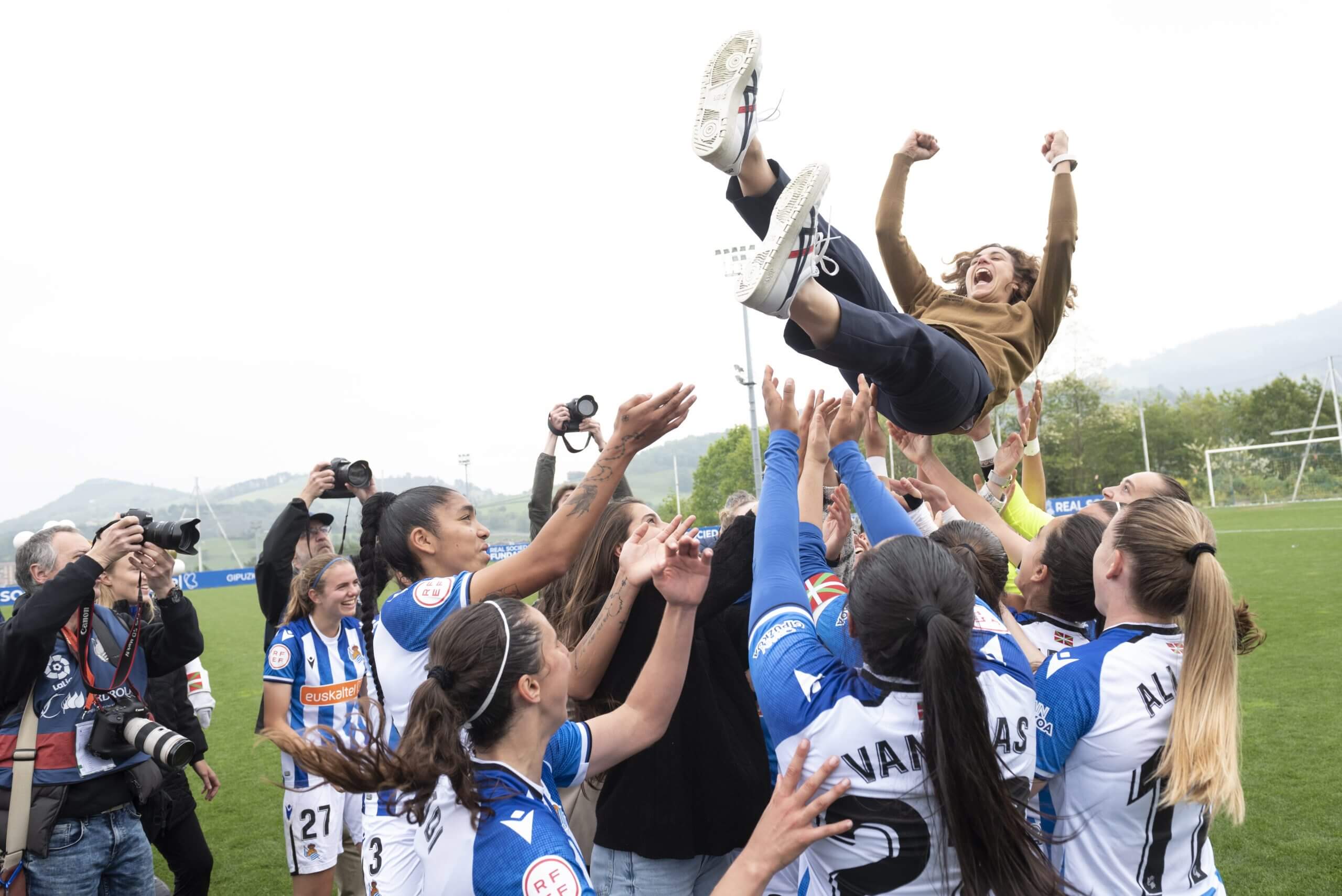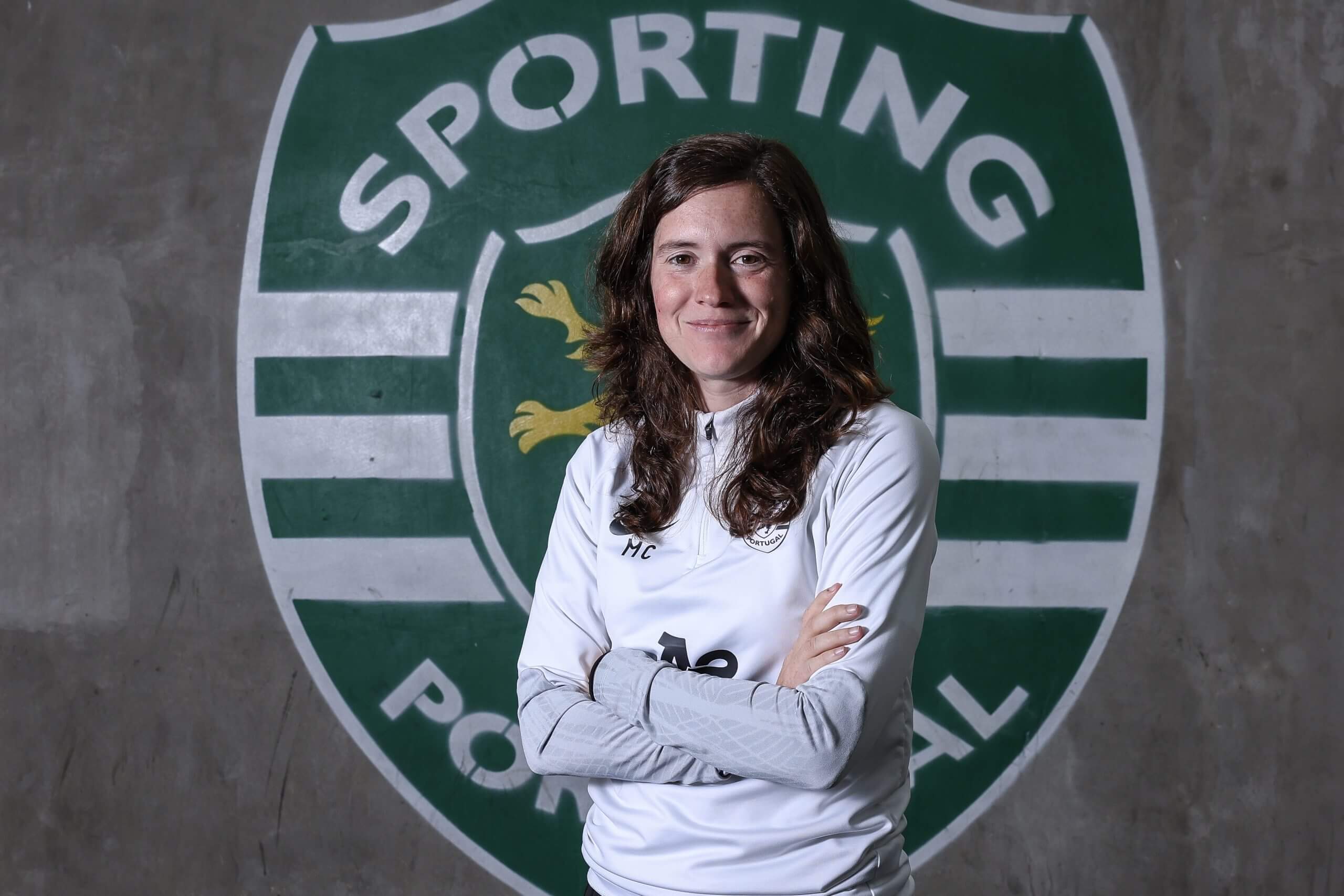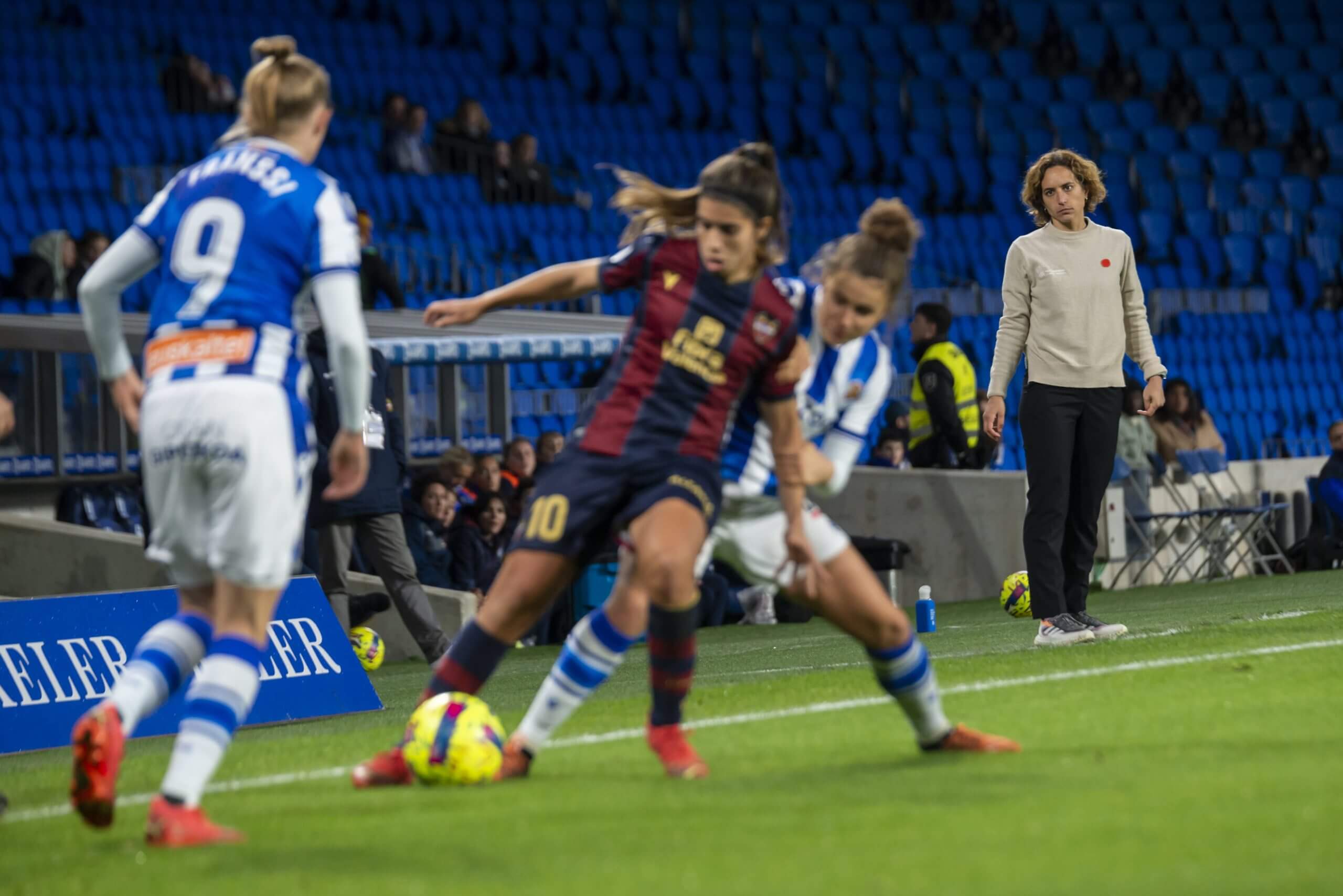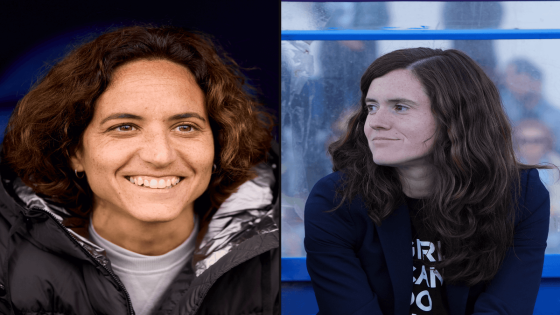Two months ago, when Scottish Premiership side Hearts were searching for a new manager, they were strongly linked with Swedish coach Kalle Karlsson — perhaps inspired by the fact another Swedish coach, Jimmy Thelin, had taken Aberdeen to the top of the table.
Unknown outside his homeland, The Scottish Sun quite reasonably said 43-year-old Karlsson would have been a “left-field choice”, and provided a bullet-point rundown of his coaching career, using information from the website Transfermarkt. What that summary overlooked was that, for most of his career in Sweden, Karlsson has not primarily been known as a football manager, but as a football journalist.
Karlsson was a reporter for Expressen and then for the country’s biggest paper, Aftonbladet. He mainly focused on tactical analysis, and his reputation grew to the extent that he became a television pundit too. His coaching career was relatively unknown until he became an assistant manager at his hometown club, second-tier Vasteras, in January 2020, while still writing for Aftonbladet, largely about the Premier League.
Midway through 2021, Karlsson became the club’s outright manager, and in his second season in charge, he led Vasteras to promotion, and their first top-flight season in a quarter of a century. By that stage, Karlsson was purely a manager. In a sense, it was going back to where he started.
“I was actually a football coach before I was a reporter,” Karlsson explains. “I was one of those who went into coaching because I got an injury when playing, when I was 18 years old. I had to quit playing football for two years, and when I came back I was playing in the fifth tier, so it was quite low. And then, after a year there, the head coach asked me to be the assistant, and also be responsible for the reserve team, so I did that for one season. But at that point I was becoming a full-time journalist. And I couldn’t be involved in coaching in the evenings and weekends because of my work — so I didn’t coach for 10 years.
“In that period, I moved to Stockholm, worked my way up in journalism, and I started to work for Aftonbladet. I was doing day-to-day reporting first, and then I started to focus more on writing about tactics. Then I had a blog where I was reporting on the Premier League, and that was growing a lot, and I got the chance to focus on that in the daytime. So, in 2012, I got more time in the evenings. Then I could take charge of a team again — so I did, but it was in the seventh tier, and then I got a job as an assistant in the fourth tier. But my journalism work was, of course, still paying my rent.”
A decade or so later, Karlsson was coaching in the Allsvenskan, Swedish football’s top division. Karlsson’s experience last season was analogous to that of Rob Edwards at Luton Town — although his side were relegated, he was commended for performing so impressively with a club unfamiliar to the top division. That was backed up by some extraordinary underlying numbers, with Vasteras’ statistics going viral midway through the season when they’d somehow scored only three goals from 18.3 expected goals (xG). They eventually finished bottom, but had the joint-fourth-best xG numbers in the division. It’s difficult to find anything comparable, from any league.
“If you go back a few years (before xG numbers were available) then probably I would have been sacked,” admits Karlsson. “Now, those statistics are there, not only for me but for all coaches. They can sometimes point at the statistics and get more patience from supporters and clubs.
“But it was tough for us, and the players. Every team who loses gets infected by it. It’s tough mentally, but the players were not frustrated in the usual way when you lose games. We missed three penalties in the first seven matches. We missed sitters, open goals, crazy stuff. We just needed to put the ball in the back of the net. Then in the summer (midway through the Swedish season) we lost three key players to injury, and sold two others. So we didn’t hit the heights of the first half of the season.”
Karlsson intends to stay with Vasteras to achieve promotion again next season, but over the winter has been mentioned as a potential candidate for vacancies at Sweden’s biggest clubs.
Karlsson’s story is not entirely unique. In Liga F, Spain’s top-flight women’s league, Barcelona run away with things every season — they’ve sometimes ended the campaign with a 100 per cent record.
Therefore, in a sense, the battle to finish second is almost the most interesting thing — and these days, that’s usually Real Madrid. But two years ago, they were beaten into second place by Real Sociedad, coached by Natalia Arroyo. Although she had previously been in charge of the Catalonia women’s team, that was her first experience of coaching a club. Like Karlsson, she had been a player whose career was cut short because of injury, and was primarily known as a women’s football journalist for a long period. She wrote for Catalan newspaper Ara, and also worked as a commentator for beIN and Movistar.
“When I was a kid, I was thinking mainly of being a commentator on television, being around the game — interviewing players or telling the viewer what is happening,” the 38-year-old Arroyo says. “But also, I was a player — a female player. You looked around and no one was informed about your game. Nobody knew if you were winning, losing — even when you are playing. So when I got older, I thought: ‘OK, there is a job to do. I really need to inform people, because I don’t buy that message of “no one cares about women’s football”, it’s not about caring. It’s about the fact there are no newspapers covering anything about our game’. Being a player wasn’t an option any more, because I’d had three surgeries in four years. So I had a mission.
“I was not a ‘real’ journalist, not looking for news, my position was more writing about the football game. The feeling that other journalists have, to look for the ‘big story’, that wasn’t my thing. I was more trying to make people understand what was happening in the game, more a coach with a keyboard — or a microphone.”

Her four-year spell with Real Sociedad, which ended in the summer, featured that second-placed finish and being runners-up in the Copa del Reina last season, but more than anything, she earned a reputation for playing bold attacking football.
“I think in most of the games we had a good approach. We put the big clubs in difficulties, and this was a big thing — the mentality of the players changed,” she says. “The club has a big history, but sometimes they felt they weren’t as capable as they were. With me being young, fresh, from another city, I think we could start to help them feel brave. We started to win the derbies (against Athletic Club) — that is something I’m proud of.”
As The Athletic reported at the start of this year, Arroyo was in the running to become Barcelona coach this season, although the job eventually went — in keeping with the club’s general approach — to their assistant, Pere Romeu. Arroyo would have become Barca’s first female manager. After that, there was briefly the possibility she was to move to the Women’s Super League this summer, but for now she’s back working in the media, including writing a column for El Pais. This week’s is about how players can train to be good from the bench.
Meanwhile, she’s waiting for her next job. “I’m thinking of making the move outside of Spain,” she says. “I’m watching more football to understand what kind of differences there are in different countries, and I am also analysing my situation — do I make a step to the side, and be an assistant? I’m open to that. Why not men’s football? Why not a national team? But being a journalist, or being in the media, is a great option for a few months because it gives me more balance in life, compared to coaching.”
There’s a similar story across the border in Portugal. As a player, Mariana Cabral was a right-back and a national champion with the Lisbon-based 1st Dezembro, who dominated Portuguese women’s football before disbanding because of financial problems. There, she was coached by Helena Costa, perhaps most notable for her brief reign in charge of men’s Ligue 2 side Clermont in 2014. “She was my biggest inspiration,” says Cabral, who retired at 25, realising that €100 a game wasn’t sufficient to consider it a true profession.
She had originally made the move from a small island in the Azores, where she grew up, to Lisbon to study journalism. “I actually thought about studying sports at the time, but I was like: ‘What can I do with sports?’. The only career path that I could see was being a PE teacher. The internet was just starting, you had to connect with dial-up, and I didn’t know much about what I could do in sports — women weren’t really involved in sports, so I thought, ‘Yeah, I can go into journalism, and then sports journalism’. And I’ve always loved writing.”
After completing her studies and an internship with A Bola — which she read daily as a child — she started to work for Expresso, a weekly newspaper, while also completing her coaching badges. She juggled the two professions successfully, covering Portugal’s victory at Euro 2016, the same year she joined Sporting CP to manage their under-19s.
“I stayed at Expresso for a decade,” she says. “Not just sports. I did news stuff. I started writing for the magazine section, more focused on sports, and they said: ‘Oh, she knows sports’. When there was an opening for the sports section, I went there.
“The highlight was Euro 2016. I went to a few tournaments with Portugal, but that was the highlight. I went alone. The newspaper didn’t send anyone else because of budgets, and no one thought that Portugal would go that far. I went alone, for 39 days, with a small bag and not enough clothes… I remember the final. We did the press conference, and were waiting for the players for a very, very long time, and they were being dickheads, most of them, because they were angry with us because we’d written that Portugal didn’t play very well (in previous rounds). So they passed through the mixed zone and ignored us. No one talked to us! It was crazy. You’d just won the final. Just talk to us, man, come on. No one did. They just went away celebrating.
“But in general it was great, because I got to interview a lot of cool people at Expresso… Jose Mourinho, Vitor Pereira who’s just gone to Wolves, Sarina Wiegman, Pia Sundhage. That was very good for me, not just as a journalist but as a coach. It was a big fountain of knowledge. That was really cool.”

Meanwhile, Cabral, having initially been at Benfica, was working her way up through the coaching ranks at Sporting. “Originally it was just boys’ teams (at Benfica), and then later with the women’s teams. That was part-time coaching in the evenings. I had my job at Expresso, and then at night I went to coach teams, and then I had games at the weekends… after so many years of coaching and taking my badges, I thought, ‘Yeah, I want to keep going through this path’.
“Journalism is often not very good to you. You work a lot of hours with no recognition and little pay. The money was better in football — although the security isn’t the same. My mother was appalled because I had a steady job! No one was going to fire me! In football, you can have a job today, and tomorrow you don’t.”
She eventually became the club’s first-team coach, taking them to second place, and a triumph in the Portuguese Cup. “That was the highlight. It was played in the national stadium in Jamor. It’s a very nice stadium, and it was also because I had won that cup as a player, and we had to fight a lot at the time to get our cup final in that stadium. It was important because of that. It was like, yes, we made it!”
Cabral’s journey was unusual, although in Portuguese football there is a historical precedent for it from the best part of a century ago. Candido de Oliveira had been a reasonably successful player with Benfica, but also worked as a journalist and author after his playing career, founding A Bola sports newspaper, where Cabral did her first internship. He’d travelled to England where he became acquainted with Herbert Chapman, and his books about Chapman’s famous WM formation prompted a revolution in Portuguese football. Oliveira had three stints in charge of Portugal, and two with Sporting. Today, Portugal’s Super Cup is named after him.
Cabral left Sporting earlier this season after a disagreement with the board about the treatment the women’s side received. She is weighing up offers from around Europe but says the National Women’s Soccer League in the United States remains the best league in the world.
Having been on the other side of the press conference, you would expect these three coaches to be comfortable in front of reporters. “The journalists always said I was super respectful to them,” says Arroyo. “Some coaches are lazy with them, but I understand the job they are trying to do. I asked my friends, when they were interviewing me, to do whatever they needed to do. Because I did the same when I was a commentator, sometimes about my former team-mates on the field. And that has nothing to do with our friendships. You need to separate the two things.”
But there is a sense of dread at times, particularly with headlines.
“I’m not short answers,” continues Arroyo. “I fear those black-and-white things — a lot of things are grey, and you need to explain them properly. And in the media, you see the headline after an interview, and it was OK… that sounds very ‘hard’, I don’t want to sound like that, because I said more things before or after that phrase, but that’s a problem I need to understand.”
The concept of headlines also occupied Karlsson’s thoughts. “Most of the time, I understand what headlines they’re looking for, when they ask the questions. So I think I know when to speak out, and when to be more reserved,” he says. “It’s a tough business, you have to scream loud sometimes to be heard, and to sell papers. I usually say, with the media, it’s not always facts, it’s more entertainment. So my philosophy is that, if I see it as entertainment, I don’t focus too much on it.”
Cabral, meanwhile, learned not to read articles about her side. “I read some of the things that the newspapers wrote, but I could tell they had no idea what they were talking about. At the start, we didn’t have people focused on women’s football in Portugal. Sometimes it was this guy, then another guy, then another woman, and they weren’t really knowledgeable about the game. So I stopped reading. I read more articles about English women’s football, or Spanish or USA than about Portugal.”
But the crucial difference between being a journalist and being a coach is dealing with individual players. And that task is the toughest to get to grips with.
“The communication with players has nothing to do with being a journalist,” says Arroyo. “That’s my feeling. It has to do with people, with emotions. It has to do with understanding the other person, and I don’t know if journalism has anything to with that. But that’s the big thing you need to have, as a coach. If you communicate well? Fine. That’s a good thing, a good skill. But in front of you, you will have someone who has a fever, someone who feels underrated, someone who feels like you’re not counting on them, and that has to do with feelings, and looking at somebody, face to face. That’s psychology.”

Karlsson concurs. “For me, it’s more about handling individuals than tactics. Julian Nagelsmann says football coaching is 30 per cent about tactics and 70 per cent about social competence, and I agree. That’s the most important thing. Tactics are important, but you need to handle so many things to be a successful manager.”
Cabral, who worked her way through the ranks, increasingly understood the value of managing humans, as much as managing footballers.
“When I was younger and starting out, I was more focused on the tactical things — how to get theoretical things and get them into training sessions,” she says. “But a lot of the older coaches, especially, talked about the other side of things: ‘How do you talk to player? How do you speak to people in different ways?’. But it’s funny because now, I have the same view!
“That’s very important. When you’re outside the game, you think more about tactics and all that stuff, but then when you’re inside, you see how people treat each other inside the group. It’s hugely, hugely important, and at the time (starting out) I didn’t really have that. Outside, we talk about a lot of stuff and we simplify things, but things are very complicated, and in football you can’t really separate tactics from human issues.”
Discovering that element of coaching has changed the way they voice opinions when working in the media. Arroyo and Karlsson say they’re less bold about voicing opinions on coaching having experienced the reality of it.
“I’m a little more careful now,” says Arroyo. “Because I understand, from the position of the coach, the number of things that we don’t really know during the week. So on a matchday, OK, maybe I would prefer another player to the one you are putting in your starting XI — but I get that there’s something that I’m missing, so I’m not so brave on saying that it’s a good thing or a bad thing.”
Karlsson says the same. “When I was working with both journalism and coaching, half-and-half, I changed a little bit. Because I got an understanding of how difficult it is, and from the outside, some decisions seem easy, but you have so much more information, so it’s more difficult to take them. When you are a reporter, it’s so easy to say after a game that the manager should have done this, should have done that, but when you’re taking these decisions beforehand, it’s so much more difficult. You have so many factors to weigh up that people don’t see from the outside.”
Overall, it is clear that being in the press box doesn’t compare to being in the technical area.
“I want to be a coach,” says Arroyo. “I feel like a coach. The adrenaline, the passion, the energy… I love that. I want that in my life. It’s fun to do things in the media, and this waiting process gives me time to analyse, to talk about football, to think in a critical way about football, and I love that. But I love that because it helps me in my future vision of being a better coach.”
Cabral is more blunt. “Oh, I’m most certainly not returning to journalism. Forget about that. No way. If there’s one thing I’m sure about, it’s that. I had a lot of invitations to do commentary, but I said no. I want to rest, and then I want to coach again.”
Karlsson sums it up best. “When you’re involved in football as a coach, it’s like a drug,” he says. “You can’t imagine being without it.”
(Top photos: Getty Images)





